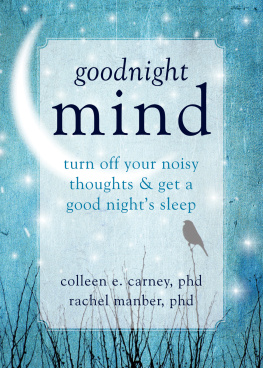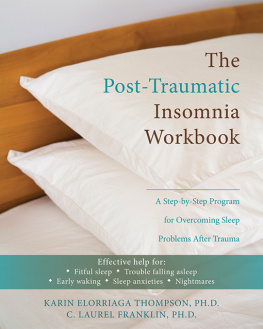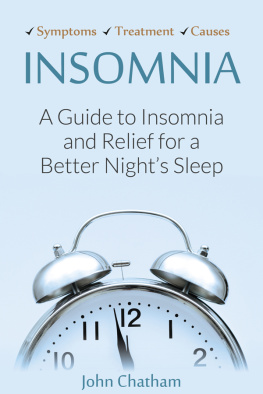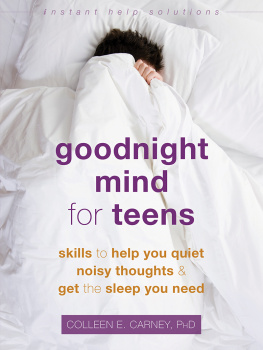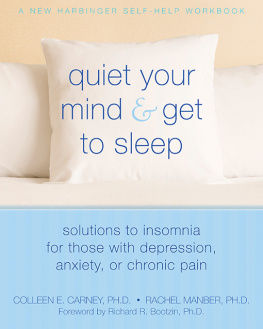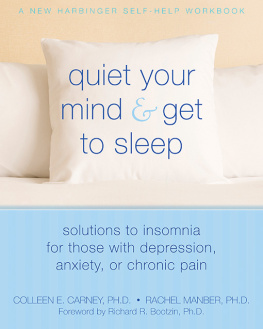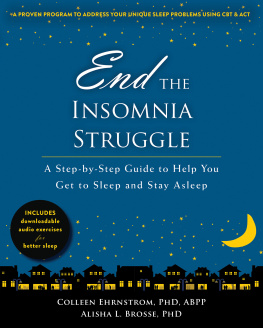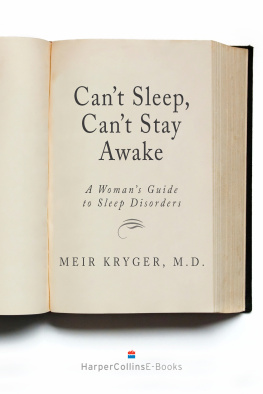
Colleen E. Carney, PhD, is associate professor and director of the Sleep and Depression Laboratory at Ryerson University in Toronto, Canada. She was a National Sleep Foundation Pickwick Fellow at Duke University Medical Center, where she was on faculty, and she founded the Comorbid Insomnia Clinic at the Duke Insomnia and Sleep Research Program. Carney is well-known for her publications in the area of insomnia and its relation to other disorders, most notably, depression, anxiety, and pain. She has made numerous presentations at national research conferences, including the Association for Behavioral and Cognitive Therapies (ABCT) and the Association for Professional Sleep Societies (APSS). She is the current president of the ABCTs Special Interest Group for insomnia and other sleep disorders. Currently, Carney is conducting research, funded by the National Institute of Mental Health, on treating insomnia in people with depression.
Rachel Manber, PhD, is professor at Stanford University and director of the Insomnia and Behavioral Sleep Medicine Program at the Stanford Center for Sleep Sciences and Medicine. She has treated hundreds of patients with insomnia, many of whom also have other medical or psychiatric disorders, and has trained physicians, psychologists, and nurses to treat insomnia without medication. A substantial portion of her research, funded by the National Institute of Health, focuses on the cognitive behavioral treatment of insomnia. She has authored many papers in scientific journals and presented her work at scientific conferences.
In Goodnight Mind, Colleen Carney and Rachel Manber have taken the complex processes needed to establish consistently good sleep and laid out a straightforward set of easy-to-follow guidelines. Nothing is left out of this bookfrom understanding your bodys sleep clock to relaxation and quieting your mind. Carney and Manber have drawn on their years of clinical research experience to develop a rich and accessible resource for those struggling with this tenacious problem.
Donn Posner, PhD, CBSM, clinical associate professor of psychiatry and human behavior at the Alpert Medical School at Brown University, and coauthor of The Cognitive Behavioral Treatment of Insomnia
We live in a busy, mentally challenging world, and keeping an alert and active mind throughout the day helps us cope with and effectively meet the challenges we face. Unfortunately for the millions of folks with chronic insomnia, persistent thinking, worrying, or more general sleep-disruptive mental arousal serve as the crux of their chronic sleep problems. Fortunately, there are a variety of effective strategies for putting the mind to bed and regaining the ability to sleep normally once again. Those strategies are clearly and comprehensively presented in this new self-help guide by Carney and Manber, two renowned experts in the area of insomnia treatment. This easy-to-read guide provides ten simple steps for keeping ones mind out of the way of a good nights sleep. I am certain that this guide will be a great aid to those who read it.
Jack Edinger, PhD, professor and director of the behavioral sleep medicine program at National Jewish Health

Publishers Note
This publication is designed to provide accurate and authoritative information in regard to the subject matter covered. It is sold with the understanding that the publisher is not engaged in rendering psychological, financial, legal, or other professional services. If expert assistance or counseling is needed, the services of a competent professional should be sought.
Distributed in Canada by Raincoast Books
Copyright 2013 by Colleen E. Carney and Rachel Manber
New Harbinger Publications, Inc.
5674 Shattuck Avenue
Oakland, CA 94609
www.newharbinger.com
Cover design by Amy Shoup; Acquired by Jess OBrien; Edited by Will DeRooy
All Rights Reserved
Library of Congress Cataloging-in-Publication Data
Carney, Colleen.
Goodnight mind : turn off your noisy thoughts and get a good nights sleep / Colleen E. Carney, PhD, and Rachel Manber, PhD.
pages cm
Includes bibliographical references.
ISBN 978-1-60882-618-6 (pbk. : alk. paper) -- ISBN 978-1-60882-619-3 (pdf e-book) -- ISBN 978-1-60882-620-9 (epub) 1. Insomnia--Treatment. 2. Affective disorders--Treatment. 3. Cognitive therapy. I. Manber, Rachel. II. Title.
RC548.C364 2013
616.84982--dc23
2013006046
Contents
Introduction
Given that you are reading this book, you may have difficulty sleeping or you may have difficulty shutting off your mind when you want to sleep. This is a very common problem, and luckily there are simple strategies to help. The most effective way to address these problems is with tools from cognitive behavioral therapy, or CBT. CBT is an approach to psychology that developed out of research into what causes sleep problems and fatigue. Knowing what causes these problems helped psychologists like us develop solutions to them. CBT is a very well tested, effective treatment approach with many tools that can be used to help you with your sleep problems.
What Causes Sleep Problems?
Many factors influence sleep. In particular, your behaviors, the way you think about sleep, and other factors exert a strong influence on how well you sleep. No matter what initially caused your sleep problemsstress, medication, or something elsethe way you think or behave can have a negative effect on your sleep and become the primary factor in sustaining your sleep problems. If you understand this basic fact, you can make changes in your thinking, your habits, or your environment that will have a positive impact on your sleep. CBT has discovered the type of thinking and the type of habits that foster good sleep, and this book will teach you how to implement these CBT strategies.
Who Should Use This Book?
If your sleep problems have led to trouble during the day, such as difficulty with everyday activities, or if they cause you distress, you may have already been diagnosed with insomnia. Perhaps you have chronic insomniafor at least a month now, it has taken you over thirty minutes to fall asleep most nights. Yet you need not have any diagnosis in order to benefit from the strategies in this book. If you simply have difficulty falling asleep or staying asleep, or you do not feel rested when you wake up, this book can help.
You may wonder whether this book will be helpful if you also have another condition, such as chronic pain, depression, or another medical problem. The good news is that CBT for insomnia is often effective even when there is another condition present.
Being more of a morning person or a night owl does not necessarily mean you have sleep problems. Many people have some degree of morning or evening tendency. But if the time at which you fall asleep varies from night to night (that is, sometimes you can fall asleep earlier and sometimes you cant fall asleep until much later) even though you are trying to keep a regular schedule, this is suggestive of insomnia, and you can benefit from using the strategies in this book.
Who Might Not Benefit
Those with sleep problems other than insomnia may not benefit from this book. If you doze off unintentionally during the day or evening, tell your doctor, as this can be a sign of another sleep disorder, such as sleep apnea syndrome or periodic limb movement disorder. An overnight study in a sleep laboratory is often needed to rule out these conditions.

